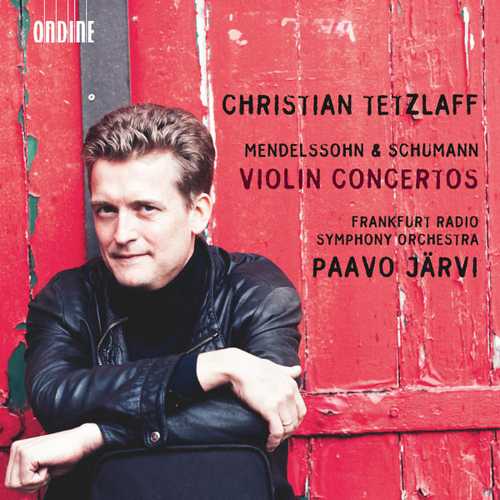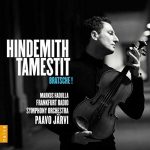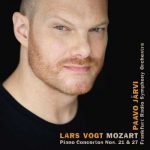
Composer: Robert Schumann, Felix Mendelssohn
Performer: Christian Tetzlaff
Orchestra: Frankfurt Radio Symphony Orchestra
Conductor: Paavo Järvi
Format: FLAC (tracks)
Label: Ondine
Release: 2011
Size: 629 MB
Recovery: +3%
Scan: yes
Robert Schumann:
01. Fantasie in C major for Violin and Orchestra, Op.131
Felix Mendelssohn:
Violin Concerto in E minor, Op. 64
02. I. Allegro molto appassionato
03. II. Andante
04. III. Allegretto non troppo – Allegro molto vivace
Robert Schumann:
Violin Concerto in D minor, WoO 23
05. I. In kraftigem, nicht zu schnellem Tempo
06. II. Langsam
07. III. Lebhaft doch nicht schnell
Violinist Christian Tetzlaff moved to Finland’s Ondine label with this 2011 release, perhaps reflecting the thinking of his new employer with the program. It combines the most standard of standard works, the Mendelssohn Violin Concerto in E minor, Op. 64, with two fairly unusual works by Schumann, the Fantasy for violin & orchestra, Op. 131, and the still rarer Violin Concerto in D minor, WoO 1. Both works were negatively impacted by the spreading word of Schumann’s descent into madness, and the concerto was completely suppressed by his successors. It was revived, ironically enough, in Germany in the 1930s after Nazi authorities banned the concerto by Jewish-born Mendelssohn. Thus, there is a kind of double linkage among the works on the album: the historical one, and the one that stems from the gradual rediscovery of Schumann’s works of the 1850s: the way to appreciate them is to listen for the ways in which they avoid sounding like Mendelssohn, or even like earlier Schumann. The concerto’s outer movements lack a memorable theme but are formally dense, even experimental. This fits the rather cerebral approach of Tetzlaff, who takes his time in both the concerto and the Fantasy and brings out many small details. The real find here, however, may be the Mendelssohn, which Tetzlaff manages to make very affecting without layering on the vibrato as in the standard approach. Instead he lets phrasing carry the load, and one feels in the end that he has stripped away a layer that generations of Russian violin tuition have brought to the work. He is aided in both cases by condcutor Paavo Järvi, who keeps the Frankfurt Radio Symphony Orchestra firmly in the background where it belongs here. A lively recording from Tetzlaff that will reward repeated hearings.



